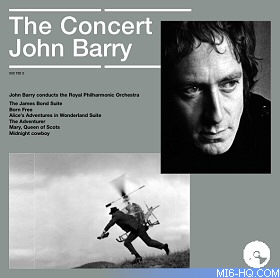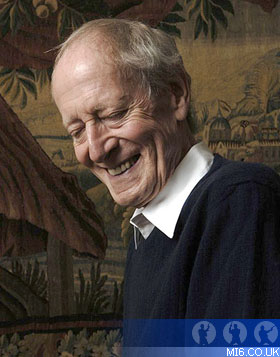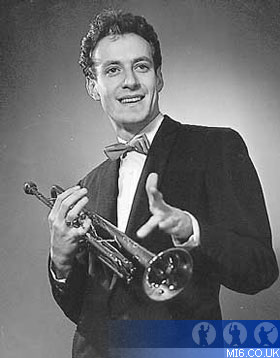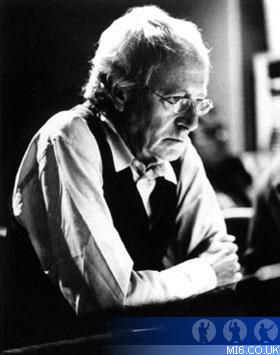 |
| |
Considered lost for decades, John
Barry's first symphonic concert is back on CD. Read
an interview with the 007 composer on this historic
find...
|
|
The Concert: John Barry
11th May 2010
|
Back in 1972, a studio recording was made
of the concert John Barry conducted
at The Royal Albert Hall, the first
symphonic concert of his career. Comprised of his work
on six James Bond films to date, the Bond Suite lasts for
almost 18 minutes and runs from "Dr.
No" to "Diamonds
Are Forever", released just one year previous.
Along with
renditions of his critically acclaimed work "Born
Free" and "Midnight Cowboy", the master
tapes of this historic concert recorded by Polydor UK were
long considered lost, until Stéphane Lerouge found
them in the archives of Universal Japan!
Almost forty years on from its original
recording, "The
Concert: John Barry" has been re-released this week
(10th May 2010) by Universal Music France. The new CD includes
a 16 page booklet featuring a new interview with Barry
and stills provided by EON Productions. |
|

Above: New CD cover artwork
 Amazon
France Amazon
France
 Amazon
USA Amazon
USA
|
MI6 readers can now enjoy the John Barry
interview conducted by film music specialist Stéphane
Lerouge for this release:
"Ever since I was a child I've considered poetry and music
to be two twin sisters, completely inseparable. Over the years
I've always tried to develop a poetic universe of my own, not
only for filmmakers but, through their films, for audiences too.
I work with very precise harmonic mechanisms to do this... and
my melodies take shape according to what these mechanisms are.
Sometimes the melodies weave together straight away; at times
they have to be guided and adjusted. But, whatever happens, they
always find a kind of foster parent with my harmonies. In my
work, the horizontal comes from the vertical."
|

|
|
British composer John Barry was referring to one of his
singularities: his unconventional approach to harmony.
This particularity of his immediately struck attentive
listeners at the dawn of the Sixties, as soon as they discovered
the music he'd written for his first films; a whole series
of box-office successes quickly followed, films thanks
to which he suddenly found himself thrust to the top as
a composer for young moderns: Born Free and The Knack,
a film that was a manifesto for Swinging London, the first
James Bonds, and then the Bond anti-hero named Harry Palmer,
who was played by Michael Caine.
Millions of cinema-goers
and music-lovers discovered the singular splendour of
John Barry's compositions for the screen: harmonic traps;
a
highly personal sense of lyricism and melody which immediately
hooked people's memories; a taste for characteristic,
unusual timbres; a desire to create surprise with the instruments
he chose... Barry walked a tightrope between the spectacular
and the cinema d'auteur. |
He is a sophisticated composer whose most visible works, the
most famous, did little to conceal a more secret vein that was
more melancholy, a vein that leaned towards introspection.
In 1972, John Barry was thirty-nine and had
just written three works, each with a different aesthetic, that
were destined
to leave an indelible stamp on the collective memory: the historical
production Mary, Queen of Scots, the James Bond film Diamonds
are Forever and his theme-music for The Persuaders. And then
Sydney Samuelson invited him to conduct the orchestra at the
third Filmharmonic concert in London. Organized as an annual
charity event, the Filmharmonic was to see a procession of
guest-conductors take up the baton: such prestigious musicians
as Henry Mancini, Elmer Bernstein, and soon Francis Lai. In
accepting Samuelson's offer, Barry was well aware of what was
at stake, if not the symbolic reach of such an offer: it would
be his first symphonic concert, and the venue was to be the
legendary Royal Albert Hall.
Miklos Rozsa, the great "Wagnerian
gypsy" in the old days of Hollywood, was to conductor
the first part of the concert, with Barry replacing him after
the intermission; it was a programme where Ben Hur extended
a hand to the spy known as 007. The division between the conductors'
roles was crystal-clear: Barry represented the present, while
Rozsa was the musical memory of films, its heritage. "I
was very impressed and quite moved to find myself facing a
legend like Rozsa," confesses John Barry today. "He
was precise and very clear, both as a composer and as a conductor.
He'd begun writing for the screen at the beginning of the talkies
in the Thirties, while I was still a little boy. In my father's
cinemas in Yorkshire, his scores for The Thief of Bagdad or
The Jungle Book were things of my dreams. Rozsa belonged to
the galaxy of composers who shaped my vocation. And then thirty
years later, there we were, sharing the same stage and the
same orchestra." Between the two halves of the concert,
it wasn't merely one conductor handing over to the second:
the baton was also clearly figurative, a transition between
the old and new worlds.
In 1962, John Barry was still fronting his John Barry Seven,
a group influenced by Bill Haley and Little Richard. Ten years
later he was at The Royal Albert Hall in tails, conducting The
Royal Philharmonic Orchestra. The concert was aired later on
the BBC during a special evening entitled John Barry and His
Music. It was more than a concert; it was a diploma that recognized
his professional ascension, almost a coronation. The trumpeter
who played with The John Barry Seven had become a young world-leader
in film-music; more than that, he had breathed new life into
it.
|
"It's true," he says today. "That
concert was a milestone in the evolution of my career in
more than one respect. That being said, I wasn't very confident:
I was going to conduct a symphony orchestra in front of
an audience for the first time. I prefer to stay in the
shadows, and the spotlight makes me feel uncomfortable.
Sammy Davis Jr. often said to me, 'Performing in front
of spectators is like being an addict: when I'm off the
stage I have withdrawal symptoms!' It was the same with
my friend Henry Mancini; he loved conducting his film-music
at concerts. For me, on the other hand, it's hell... I
don't like exposing myself in public. I take pleasure in
isolation: I like the solitude, with just a sheet of blank
music-paper in front of me; or else in the studios, where
things I've imagined on paper come to life thanks to the
musicians. There's a dimension that fascinates me in the
process of creation, particularly composing and recording...
a mysterious one that belongs to something intimate, inexplicable.
It's a dimension that partly escapes the creator. For all
those reasons, it took a violent effort for me to go onstage
at The Royal Albert Hall. But it had its rewards: the audience
was incredibly enthusiastic and receptive. Once the concert
was over, I had a smile on my face again." |
|

|
One has to give credit to the composer for submitting
his scores to a vigorous overhaul, given the Royal Philharmonic's
instrumental
line-up. Barry had to rethink the orchestration of certain works
due to the absence of a rhythm section, and also key instruments
such as the Moog used in the film On
Her Majesty’s Secret
Service, the cimbalom in The Persuaders or The Adventurer, or
else the harmonica in Midnight Cowboy. "It would have been
frustrating to ask Toots Thielemans to come in just for one piece," he
concedes. "I had a full orchestra at my disposal, so it
was up to me to adapt. At a pinch, you could say it was a game,
a rather stimulating exercise. I managed to compensate for the
absence of some of the soloists by making full use of the orchestra's
resources. I had a trumpet play the main role in Midnight Cowboy,
for example: it's still the same piece, but the change of instrument
causes the music to take on a different character."
"Some of his
most performed pieces are here but when scored specially
for the Royal
Philharmonic Orchestra, another dimension is added. The
James Bond Suite takes on a new size and I am sure will
be regarded as a work of major importance. If Bond is
007, Barry is 008." - Lyricist Don Black on the
original sleeve notes.
|
One
of the high points in the concert was a shattering James Bond
Suite that lasted seventeen minutes, a kind of musical compression
of the first seven Bond films, from Doctor No to the film Diamonds
are Forever, which had been released in cinemas the previous
year. "I tried to preserve the best of the Bonds, and write
a resume in a suite with a continuity that's fluid, logical and
natural," explains John Barry. "With hindsight, you
can see that this suite corresponds to the "classic" period
in the series, a period which ends with Diamonds, the last film
with Sean Connery. Obviously that period is my favourite, and
its template still remains Goldfinger, the Bond film where, in
terms of style, all the codes and references found their place:
the gun-sights, the opening sequence, the animated main-title,
Peter Hunt's editing... It was also the first Bond where I had
sole responsibility for the music; so I was able to assert a
compositional style inspired by what I learned from Bill Russo,
Stan Kenton's arranger: a particular way of adapting the brass
right across the register from the deepest bass to the highest
treble, with sharp attacks and incisive punches. That's where
you find the roots of the 'Bond sound'."
It was something
of a paradox that Barry created his Bond Suite just when he
was about to move on from 007: during the period featuring Roger
Moore, Barry went back to the Bond films intermittently, bidding
his final farewell to the series in 1987 with The
Living Daylights.
The first Timothy Dalton film was the last Barry. Years have
passed, but the James Bond Suite has stood the test of time:
even today, it invariably concludes the composer's concerts
throughout
Europe.
|

|
|
For the rest of his Filmharmonic concert, John Barry drew
up a subtle balance, with doses of music from the emblematic
soundtracks of the Sixties – Midnight Cowboy and
the Oscar-winning Born Free, a grandiose evocation of nature
and wide open spaces – and some recent works: the
theme-tune for the Adventurer television series (a more
serious face which had a more dramatic symphonic treatment),
the main theme from Mary, Queen of Scots (where the grace
of Erich Gruenberg's violin seems to make time stand still)
and, above all, Alice’s Adventures in Wonderland,
a new adaptation of the Lewis Carroll classic. With the British
release of Australian director William Sterling's film only
two months away, Barry unveiled its three central themes – three
ballads – as a seductive, seven-minute suite. Carroll's
subject took Barry's imagination – and also that of lyricist
Don Black – to a much higher level: their readings of
Alice translated not so much the picturesque in Carroll's universe,
but rather its serious, psychoanalytical dimension.
|
The Me
I Never Knew, especially, carried the composer's art to its
quintessence, with a sad lyricism and sinuous song-lines perverted
by abrasive harmonies. Barry was never bettered in the search
for a musical equivalent to the troubling tale written by Lewis
Carroll and its profound themes: traversing the mirror, and
the loss of innocence.
There were two consequences to the triumphant
welcome reserved by Filmharmonic 1972: first, John Barry returned
to the stage
of The Royal Albert Hall for the event's subsequent edition
a year later; and Barry also went to Abbey Road to record a
large part of the concert for Polydor, the record-label with
which he had just signed a contract as an artist. Released
towards the end of 1972, The Concert John Barry became the
first 33rpm LP produced under the new contract. It was never
reissued in its entirety, curiously, because the master-tapes
were reported missing. Providence, however, took a hand thirty-eight
years later when the tapes were located among the archives
of Universal Music in Japan. Today their discovery has resulted
in this CD reissue of a historic album, and the music is enhanced
by the addition of other John Barry classics from the Seventies:
first there are the Polydor versions of Walkabout and the 1970
western Monte Walsh, and they are completed by The Deep (which,
according to Barry, was "A terribly complicated film to
set to music: most of the action took place underwater"),
and The Day Of The Locust – a caustic pondering of the
dark side of Hollywood – which also marked the second
time the composer had worked with director John Schlesinger,
five years after Midnight Cowboy.
In many respects, The Concert
John Barry came as a milestone-recording in the composer's
career. For John Barry, it was an opportunity to take his film-music
to the concert-stage, like Prokofiev adapting the suites from
Lieutenant Kijé or Alexander Nevsky. It was also a means
of giving the public a synthesis of his first ten years in
films. Twenty years later, Barry would extend that approach
when he conducted the Royal Philharmonic Orchestra again for
two albums entitled Moviola. In the interval, his repertoire
had grown to include such gems as Somewhere In Time, Body Heat,
Frances, Out of Africa, Cotton Club and Dances with Wolves.
But above all, Barry's writing had grown fuller and matured;
an impression that was confirmed by his diptych The Beyondness
of Things/Eternal Echoes, composed at the turn of the 21st
century. The colours appear more autumnal, and his inspiration
is more elegiac, more introspective, too. As if, in the man
and the artist, the share of melancholy had definitively gained
the upper hand.
In the light of this evolution, revisiting
The Concert John Barry takes on extraordinary interest: "I've
rediscovered this album with emotion," concludes Barry
with a smile. "It's a look in the rear-view mirror, a
photograph of the way I was composing and conducting during
that period. Curiously enough, I was the first to be surprised
when I heard the sound of my music at a concert; it hadn't
been written with that in mind. Conceived for pictures, it
could exist perfectly well outside that context and lead its
own life in total autonomy. I'd hoped that this would be so
but, until then, I had no concrete evidence. That's the experience
I gained from this adventure: to me, it's the major impression
left by The Concert."
"The Concert: John Barry" was released in France
on 10th May 2010 by Universal Music France. The USA release will
follow on 18th May 2010 through 101 Distribution
Thanks to Stéphane Lerouge for his kind
permission to publish this interview.